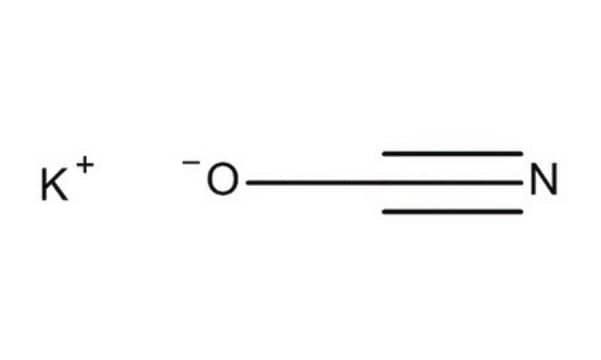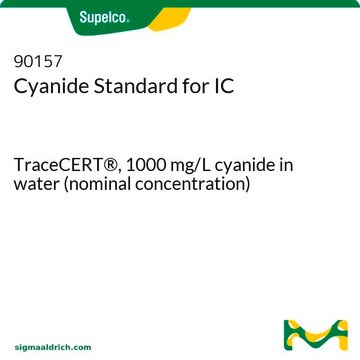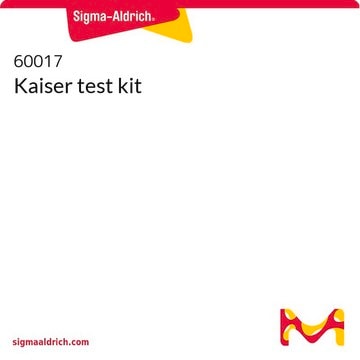1.04965
Potassium cyanide
EMPLURA®
Synonym(s):
Potassium cyanide, Cyanogen potassium
About This Item
Recommended Products
Quality Level
product line
EMPLURA®
Assay
≥96% (silver nitrate titration)
form
solid
potency
7.49 mg/kg LD50, oral (Rat)
14.29 mg/kg LD50, skin (Rabbit)
pH
11-12 (20 °C, 20 g/L in H2O)
bp
1625 °C/1013 hPa
mp
634 °C
density
1.55 g/cm3 at 20 °C
bulk density
750 kg/m3
anion traces
sulfide (S2-): ≤0.001%
cation traces
Na: ≤1%
storage temp.
15-25°C
SMILES string
[K+].N#[C-]
InChI
1S/CN.K/c1-2;/q-1;+1
InChI key
NNFCIKHAZHQZJG-UHFFFAOYSA-N
Related Categories
Application
- Supramolecular Gels Based on C(3)-Symmetric Amides: This study demonstrates the application of potassium cyanide in the development of supramolecular gels used for anion-sensing and dye removal from water. It highlights the role of potassium cyanide in enhancing the functionality of materials designed for environmental cleanup and monitoring, aligning with sustainable research practices in material science (Kuppadakkath G et al., 2024).
- Binucleate Rhizoctonia induced tomato resistance against Rhizoctonia solani: This research explores the use of potassium cyanide in studying plant-pathogen interactions, particularly focusing on enhancing tomato plant resistance against fungal diseases. The application in agricultural biotechnology demonstrates the potential of potassium cyanide in developing disease-resistant crop varieties, contributing to sustainable agriculture practices (Taheri P et al., 2024).
Analysis Note
Sulphide (S): ≤ 0.001 %
Na (Sodium): ≤ 1 %
Legal Information
Signal Word
Danger
Hazard Statements
Precautionary Statements
Hazard Classifications
Acute Tox. 1 Oral - Acute Tox. 2 Dermal - Acute Tox. 2 Inhalation - Aquatic Acute 1 - Aquatic Chronic 1 - Met. Corr. 1 - STOT RE 1
Target Organs
Thyroid
Supplementary Hazards
Storage Class Code
6.1A - Combustible, acute toxic Cat. 1 and 2 / very toxic hazardous materials
WGK
WGK 3
Flash Point(F)
Not applicable
Flash Point(C)
Not applicable
Certificates of Analysis (COA)
Search for Certificates of Analysis (COA) by entering the products Lot/Batch Number. Lot and Batch Numbers can be found on a product’s label following the words ‘Lot’ or ‘Batch’.
Already Own This Product?
Find documentation for the products that you have recently purchased in the Document Library.
Customers Also Viewed
Our team of scientists has experience in all areas of research including Life Science, Material Science, Chemical Synthesis, Chromatography, Analytical and many others.
Contact Technical Service![Cyanide standard solution traceable to SRM from NIST K₂[Zn(CN)₄] in H₂O 1000 mg/l CN Certipur®](/deepweb/assets/sigmaaldrich/product/images/920/032/af45eec3-100b-4996-8eb3-c3942d441bc9/640/af45eec3-100b-4996-8eb3-c3942d441bc9.jpg)











